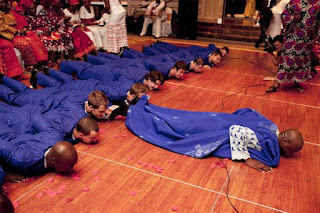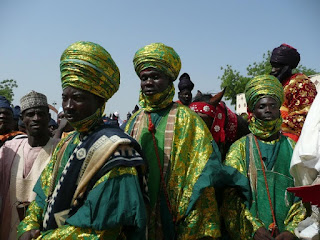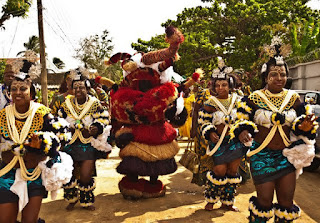THE YORUBA PEOPLE
The People of YORUBA
 In the late 1800s, the Yorubas formed a
treaty with the Fulani and in 1901 they were colonised by the British. Because
of their enmity with the Fulani who are the great Islamic evangelists, most of
the Yoruba people do not hold to Islam but instead worship many of the gods and
spirits that the Yoruba hold to.
In the late 1800s, the Yorubas formed a
treaty with the Fulani and in 1901 they were colonised by the British. Because
of their enmity with the Fulani who are the great Islamic evangelists, most of
the Yoruba people do not hold to Islam but instead worship many of the gods and
spirits that the Yoruba hold to.
ORIGIN
The Yoruba homeland is located in West Africa. It stretches from
the savannah (grassland) region in the north to a region of tropical rain
forests in the south. However there are also some scattered groups in Benin and
Togo and small countries to the west of Nigeria.
Current census figures are difficult to obtain but the Yoruba
population is estimated to be about 5.3 million.
The Yorubas originated from Ile-Ife,
arose and became quite popular by their trading with the Portuguese, which gave
them a large supply of guns.
However, they were unable to push back
the Fulani who invaded them and pushed much of the Yoruba to the south.
 In the late 1800s, the Yorubas formed a
treaty with the Fulani and in 1901 they were colonised by the British. Because
of their enmity with the Fulani who are the great Islamic evangelists, most of
the Yoruba people do not hold to Islam but instead worship many of the gods and
spirits that the Yoruba hold to.
In the late 1800s, the Yorubas formed a
treaty with the Fulani and in 1901 they were colonised by the British. Because
of their enmity with the Fulani who are the great Islamic evangelists, most of
the Yoruba people do not hold to Islam but instead worship many of the gods and
spirits that the Yoruba hold to.
Economically, Yoruba people primarily
engage in agriculture, with about 15% of the people employed as merchants or
artists and craftsman.
One of the features that make Yoruba people
unique is their tendency to form into large city groups instead of small
village groups. The Yorubas are today one of the three main ethnic groups that
make up Nigeria. They can also be found in neighbouring countries. For example
in the United States of America, they occupy a place called cuba.
OCCUPATION
·
Agriculture
·
Craftmanship & Hunting
FESTIVAL
Local festivals are usually dedicated to
individual deities. Yoruba may also celebrate the following holidays, depending
on whether they are Christians or Muslims: New Year's Day, January;Eid al-Adha(Feast
of Sacrifice), June or July; Easter, March or April;Maulid an-Nabi(Muhammad's
birthday); Ramadan, followed by a three-day feast; Nigerian Independence Day
(October);Eid al-Fitr; Christmas (December..).
Yoruba has lots of traditional festivals. Some very popular
festivals are ogun , odun ijesu (new yam), egungun, osun, eyo, sango, sanpona,
yemoja (goddess of fertility) and ifa, oya (wife of sango). The most prominent
of these festivals is the Osun festival.
TABOOS
Below are some taboos in Yoruba land.
• It's a
taboo for a child to disrespect an elderly person.
• It's a
taboo to collect rain water with bare hands.
• If
someone dies in a river, he must be buried by the river.
• Don't
hold knives when it is raining.
• It's a
taboo for a pregnant woman to walk on the street at noon.
• You must
not throw salt in the fire.
• People
from certain towns are forbidden from eating some kind of animals.
• A king in the Yoruba land must not look
into the inside of his crown and a calabash opened before a serving king means he
should go on exile and leave his throne.
• It's a
taboo to open an umbrella inside the house.
• A child
must not look at the elder by the eye when the child is being rebuked.
• A child
must not talk at the same time when the elders are talking.
FOOD
The Yoruba diet consists of
starchy tubers, grains, and plantains. These are supplemented by vegetable
oils, wild and cultivated fruits and vegetables, meat, and fish. The average Yoruba
family diet relies mostly on amala and ewudu soup or amala with gbegiri soup or
eforiro . One of the most popular foods is iyan (pounded yam ) with eforiro
or amala and ewedu with obe ata dindin. One food that is popular in every Yoruba
occasion is amala and ewudu or eforiro and iyan (pounded yam)
PROMINENT
LEADERS
·
General Adekunle Fajuyi
·
Babatunde Fashola
·
General Benjamin Adekunle Rtd
·
Bola Tinubu
·
Bukola Saraki
·
Ernest Shonekan
·
Femi Fani-Kayode
·
Femi Gbaja Biamila
·
Herbert Macaulay
·
Lawan Gwadabe
·
M.K.O. Abiola
·
Nicolas Grunitzky
This
article is gotten from various websites and blogs such as: www.wikipedia.com, www.cometonigeria.com, www.everyculture.com, www.yorubaculture.weebly.com and www.buzznigeria.com
Leave your comments below




Have really learnt new things about the Yoruba people, keep the good work.
ReplyDeleteThank you, promise to serve you better.
Delete